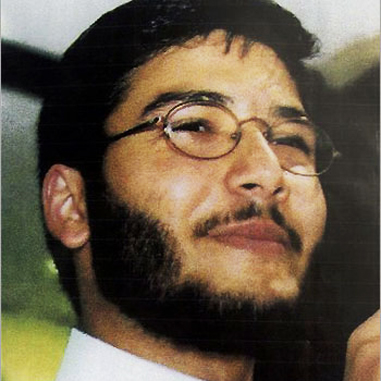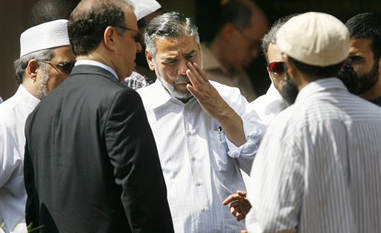 The following text represents the bulk of Ahmed Abu Ali's statement to the court at his re-sentencing on Monday, July 27, 2009 at the federal courthouse in Alexandria, Virginia. The text is based on notes from a Muslim Link newspaper reporter present at the hearing. A full-text transcript based on court records will be posted on muslimlinkpaper.com as soon as one becomes available.
The following text represents the bulk of Ahmed Abu Ali's statement to the court at his re-sentencing on Monday, July 27, 2009 at the federal courthouse in Alexandria, Virginia. The text is based on notes from a Muslim Link newspaper reporter present at the hearing. A full-text transcript based on court records will be posted on muslimlinkpaper.com as soon as one becomes available.
After Ahmed's family took civil action against the United States government for its inaction, Ahmed was dramatically brought to the US in February of 2005 and arraigned on criminal charges alleging he was part of an Al-Qaeda plot to assassinate then President George W. Bush.
 The government's evidence consisted almost solely on testimony from Saudi intelligence officers who spoke via tele-link, and on a video tape showing Ahmed “confess” to being a part of a plot. The defense maintained Ahmed was tortured and coerced into making the confessions and brought expert testimony to show this. Some Canadian citizens tortured in Saudi detention were barred from giving testimony in the trial. Legal experts and human rights organizations across the country watched the trial closely. Amnesty International produced a report wherein they stated:
The government's evidence consisted almost solely on testimony from Saudi intelligence officers who spoke via tele-link, and on a video tape showing Ahmed “confess” to being a part of a plot. The defense maintained Ahmed was tortured and coerced into making the confessions and brought expert testimony to show this. Some Canadian citizens tortured in Saudi detention were barred from giving testimony in the trial. Legal experts and human rights organizations across the country watched the trial closely. Amnesty International produced a report wherein they stated:
“Amnesty International is seriously concerned that the trial of Ahmed Abu Ali may set a precedent in US courts of according unqualified support to the declarations of a foreign government regarding its human rights record as a means of rendering evidence admissible, including statements obtained by torture and ill-treatment. In this case, the statements of officials from Saudi Arabia, a state with a clear record of widespread torture and ill-treatment, flatly denying that such practices existed appear to have been taken at face value with no serious attempts allowed to challenge the claims presented” (Source: USA: The Trial of Ahmed Abu Ali - Findings of Amnesty International's Trial Observation, Published December 14, 2005)
After a jury trial where he was found guilty on all counts, Ahmed was sentenced to 30 years on March 29, 2006. The government appealed the sentence, seeking a life sentence for Ahmed. The Court of Appeals for the 4th Circuit upheld the government's appeal, directing Judge Lee to re-sentence Ahmed. On July 27, 2009, Judge Lee reversed the bulk of his prior sentencing logic, agreeing with the government and stating after a 30-year sentence, Ahmed being free was a “risk of the unknown ...too great”. He sentenced Ahmed to life.
The re-sentencing statement follows:
All Praise is due to Allah, Lord of the Universe, the Most Merciful, the Especially Merciful, Master of the Day of Judgment. I thank Allah for His countless bounties, His never ending grace, and peace be upon all His messengers and prophets, especially Noah, Abraham, Moses, Jesus the Son of Mary, and the last and final prophet and messenger, the descendant of Ismail the son of Abraham, Muhammad.
I want to acknowledge and thank my family, some of whom are here, my parents, for their steadfast faith, their beautiful faith and sacrifice, and my brothers and sisters, all of them, I hope I can be with them soon and make up for the lost time. Also, I thank my friends who contributed to my defense, for their prayers and sacrifice, and [also] those I don't know, and Allah knows them.
To proceed, I'm not ungrateful to this court for the relative civility it has shown me, and I also have been civil with this court. But, I cannot pretend this is justice. The facts of this case were clear. This case was manufactured by the Saudi torture machine, the Mubahith, and exported to the United States.
There is no doubt that I was tortured. This case was prosecuted by a rouge Department of Justice, headed by the same people who crafted laws [allowing torture].
Had this case been a drug case or a murder case, it would have been forgotten. But if you introduce the word 'terrorism' in it, America has a second standard.
I'm being held in solitary confinement. Even nazi [war criminals] did not face [the prison conditions I have been facing]. If the government wants to dehumanize me, they should have sent me to a zoo. But we are not animals, we are distinguished by our intellect, our emotions, our manners, our empathy.
I think you have heard of this book rejection, harmless books, this is the type of tyranny I have to face everyday. To give you one example, the book by Jimmy Carter “Peace Not Apartheid” was denied [to me] because it contains “jihadist rhetoric”. They don't let me communicate with my grandmother because the government thinks they are saving lives by me not being able to say hello, how are you, I'm praying for you, how are my uncles ...
Even letters to my family take months to get there. If I send them a letter now wishing them [a blessed] Ramadhan which starts in about one month, they will get it at the start of the pilgrimage.
They deny me the right to worship in congregation. We [Muslim prisoners] have protested. Even though we are behind bars, we are being prevented from praying in congregation. This reminds me of the story of Moses, when he told the Pharoah to let the children of Israel go, the Pharoah in his arrogance said I don't know who your Lord is. The government won't let the children of Ismail worship together behind bars ... despite the protests, the hunger strikes going on every year. Another hunger strike began in April. The [Bureau of Prisons] would rather spend hundreds of thousands of dollars to force feed prisoners instead of giving them their basic rights. I don't know where they get the money for this especially during this difficult financial crisis.
They say I am a criminal. I say may God's curse and wrath be upon the criminals among us.
Judge Lee, I remind you, you too will appear before the Divine tribunal – with me. On that day, there will be no lawyers, no sophistry ... nothing will be hidden. He knows the whisperings in the chests. If you [Judge Lee] are comfortable with that, you can decree upon me whatever you will decree.
[After the sentence, Ahmed was led out by the Marshal. He turned to the audience and said “Nasr Qareeb (ie. The help of Allah is close) and then said “Don't be sad”. A full report will be printed in the next print issue of the Muslim Link, insha'Allah.]









Comments powered by CComment